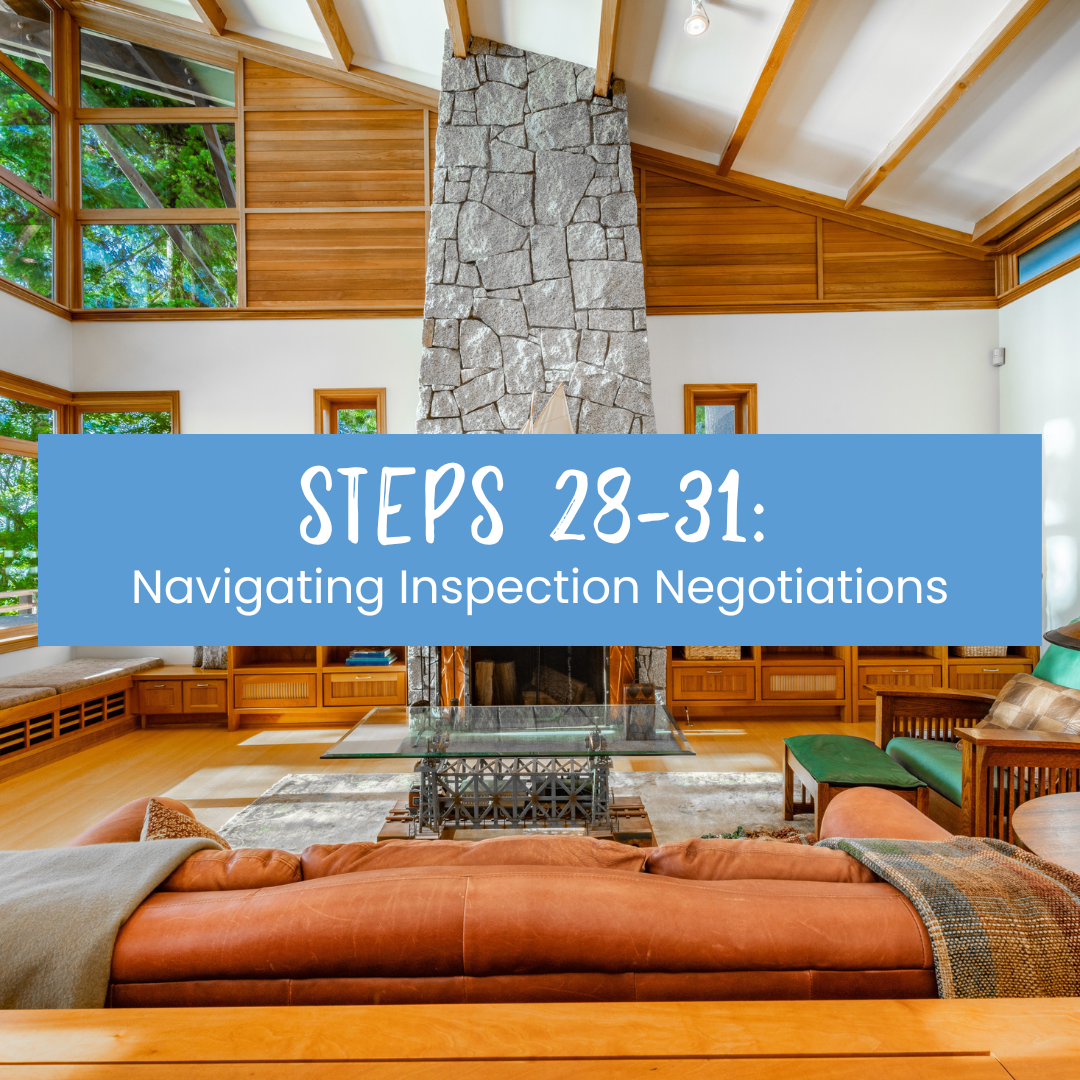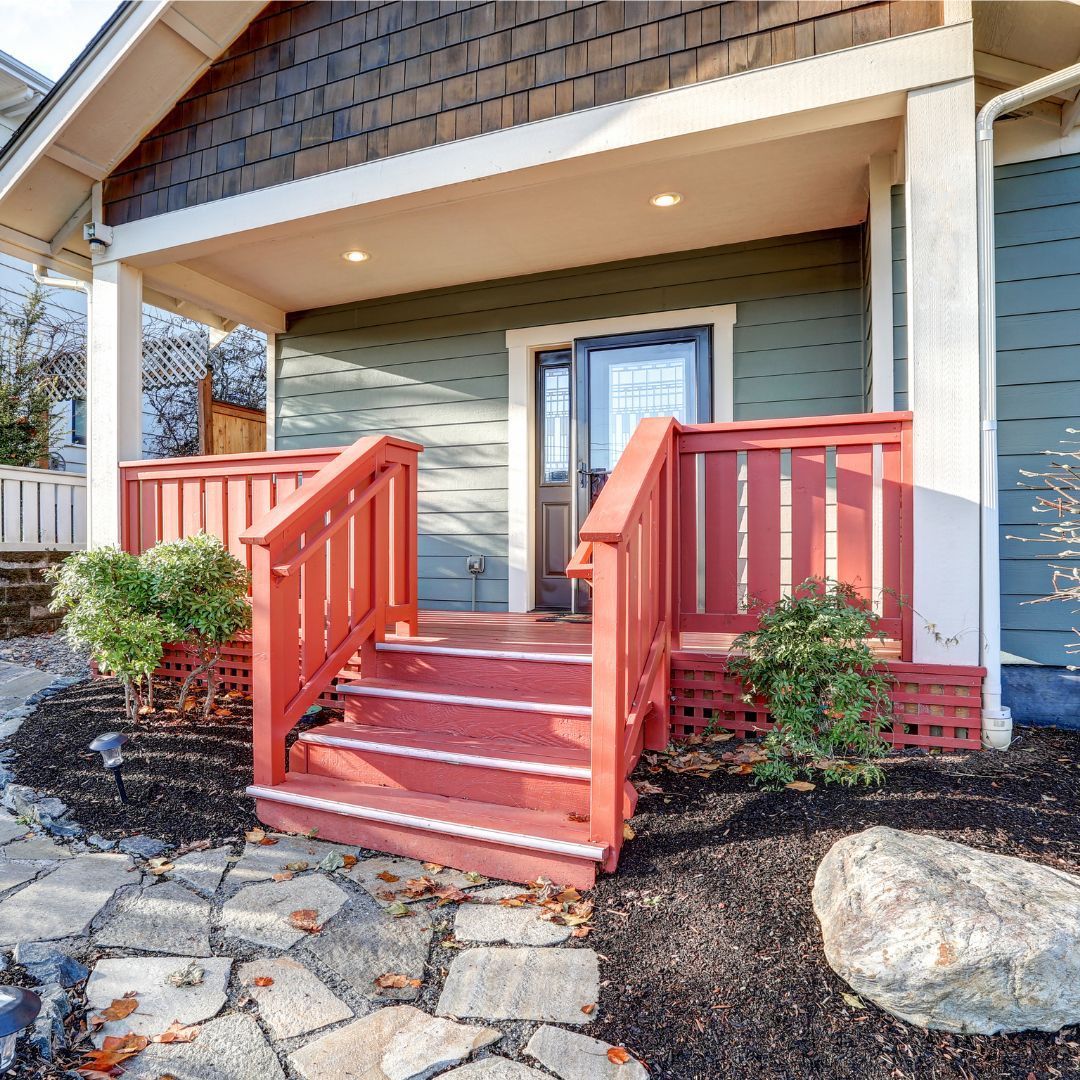Buying Steps 28-31: Navigating Inspection Negotiations

Step 28
Once you receive the Inspector’s report, we will both review it.
Most home repairs are negotiable. Be prepared to pick your battles: Minor issues, like a cracked switch plate or loose kitchen faucet, are easy and cheap to fix on your own. You don’t want to start nickel-and-diming the Seller.
We are going to start with some background so we can make the best plan for you. Hey, I haven’t laid any real estate history on you yet, so this is important. I’m going to explain our NEW Standard Operating Procedure per our attorney for Washington REALTORS®.
“Historically, Buyer Brokers have drafted Buyer requests for repairs (Inspection Response Form 35R) by attaching a page or two from the Inspector’s report identifying a problem that Inspector noted and then instructing Seller to hire further investigation and correction of the issue. When a Seller agrees, Seller is then vested with full authority to select the expert who will conduct further investigations and determine needed corrections, if any. The result of this is that too often, Seller delivers by hiring a specialist who reaches conclusions that do not conform to Buyer’s expectations based on the urgency and crisis created in Buyer’s mind by discussions with Buyer’s Inspector. The reason inspection requests are drafted in this way is because real estate Brokers are not specialists with respect to the problem or the solution identified by Inspector. Since Brokers cannot diagnose the problem or the solution, their suggestion to Buyer is that Buyer surrender the issue to a specialist. That is appropriate. The problem is that our industry has fallen into the habit of surrendering Buyer’s inspection contingency to a Seller-selected specialist who naturally places immediate cost savings over long-term sustainability. That is the disconnect between Buyer expectations and Seller deliveries.
Rather than surrendering Buyer’s inspection contingency to Seller-selected specialists, Buyer Brokers should be assisting Buyers to consult a Buyer-selected specialist to determine the work and costs associated with the work, necessary to correct problems identified by Buyer’s Inspector. This means that during the inspection contingency, Buyers should be bringing contractors into Seller’s home who can diagnose problems identified by the Inspector and suggest repairs, along with associated costs, sufficient to resolve the problem for Buyer’s long-term use. Armed with knowledge provided by Buyer’s chosen specialist, Buyer can then negotiate either a price concession or Seller payment of Buyer closing costs in the amount of the repair so that Buyer ends up with that sum following closing and can hire the contractor to make the repair. In the alternative, Buyer can ask Seller, via Form 35R, to hire the identified contractor to make the repairs identified on the contractor’s bid. Either way, Broker is removed from the task of identifying the solution to a problem Buyer’s Inspector identified and Buyer is empowered to control the solution to the problem. Seller is equally advantaged by the ability to apply a purely economic analysis to the request Buyer makes, free from stressful calculations associated with finding a contractor they can hire to make a repair they may or may not agree is needed.
The nuts and bolts of the inspection contingency addendum (Form 35) make all of this background work possible although Brokers may need to develop their understanding of the form and shift the time periods associated with completion of the form. The initial inspection period (ten days by default) requires Buyer’s conformity to the Home Inspector statute. The statute allows Buyer to personally conduct an inspection or Buyer may hire a licensed, whole home Inspector only to conduct the inspection of Seller’s home. Additionally, during this period, Buyer may bring a licensed electrician, plumber and engineer into Seller’s home to inspect the electrical, plumbing and structural components of Seller’s home. Then, during the “Additional Inspections” period (five days by default) Buyer may bring a “specialist” into Seller’s home to diagnose problems and suggest solutions. During the Additional Inspections period, Buyer may, without additional Seller consent, bring contractors into Seller’s home to propose solutions to the problems identified by Buyer’s Inspector. Buyer must trigger the Additional Inspections period by timely claiming the additional time and providing the Inspector’s recommendation for additional investigation.”
MARKERS IN TIME
by Annie Fitzsimmons, Washington REALTORS® Legal Hotline Lawyer | Oct 10, 2019
It is in your best interest to get your own bids after the Inspection. Other options include:
- If the Seller agrees to make all of your repair requests: He or she must provide you with invoices stating that the repairs were made. Then it’s full steam ahead toward the sale.
- If the Seller responds to your repair requests with a counteroffer: He or she will state which repairs (or credits at closing) he or she is willing to make. The ball is in your court to either agree, counter the Seller’s counteroffer or terminate the transaction.
Remember to check in with yourself to see how you’re feeling about all of this. You will find something objectionable in the home inspection report. You need to be realistic about how much repair work you’d be taking on. At this point in the sale, there’s a lot of pressure from all parties to move into the close. But if you don’t feel comfortable, speak up.
If you are still within the time frame for the inspection period you should be able to get out of your contract to purchase the property and be refunded your earnest money. This is the exact reason we have an inspection period and hire an Inspector. It’s also the reason you want to make sure you’re working with a great REALTOR®.
In order for you to get out of the contract due to a bad inspection, we will need to terminate the agreement and get your Earnest Money back. If all parties involved are being responsible and reasonable, this can hopefully happen quickly but plan that it could take up to a few weeks to get your earnest money back potentially.
The most important things to remember during the home inspection? Trust your Inspector, trust your gut, and lean on your agent — they likely have a lot of experience to support your decision-making.
That’s something to feel good about.
Questions? Contact us at andi@andidyer(dot)com or 360-734-6479.
Step 29
We get asked for recommendations on “the safest places to live in Whatcom County” all the time. By law we are not allowed to answer that question for several reasons:
- It violates Federal Fair Housing standards which are meant to deter agents from steering Buyers into or out of certain areas.
- My idea of safe might not be the same as your idea of safe. For example, are you worried about crime, natural disasters, clowns, or those adorable Girl Scouts selling cookies door to door and compromising your diet? “Safe” is subjective.
So, what do you do if you are new to the area and have questions about crime rates?
We recommend checking out the following websites as part of your investigations:
- Bellingham Herald – Local Crime
https://www.bellinghamherald.com/news/local/crime/
- City of Bellingham – Police Activity
https://cob.org/gov/dept/police/news-police/police-daily-activity
- National Sex Offender Registry
- Neighborhood Scout
https://www.neighborhoodscout.com/
- If you are looking at a home in the County, Ferndale or Lynden, etc. check their sources as well.
Drive around the area you’re thinking of living in both at night and during the day to see what it’s like. Visit the police station and talk to the police offers. They can answer any questions you have and give you, their perspective.
Questions? Contact us at andi@andidyer(dot)com or 360-734-6479.
Step 30
Can You Back Out of a Purchase & Sales Agreement?
We often get asked by Buyers if they can terminate a Purchase & Sales Agreement they’ve signed due to a change of heart or because they found a different house they like better. Here's what you need to know:
Step 1: Consult Your Attorney
Always consult your attorney for legal advice specific to your situation.
Step 2: Understanding the Agreement
- If the Purchase & Sales Agreement has been executed (signed by both Buyers and Sellers), there are typically limited ways to back out.
- In the state of Washington, there are often options during the Inspection Period.
Step 3: The Inspection Period
- Once the Purchase & Sales Agreement is executed, there is typically an Inspection Period, usually lasting 5 to 10 days.
- During this time, the home inspection takes place.\
Step 4: How to Back Out During the Inspection Period
- Most agreements include a clause allowing the Buyer to back out if they are unhappy with something in the Inspection Report.
- If you choose to terminate the agreement during this period, you can typically:
- Request to cancel the agreement due to inspection issues.
- Request a refund of your Earnest Money.
- This must all happen before the Inspection Period ends.
Step 5: After the Inspection Period
- Once the Inspection Period has ended, it becomes very difficult—if not impossible—to back out of the agreement and get your Earnest Money refunded.
Questions? Contact us at andi@andidyer(dot)com or 360-734-6479.
Step 31
If you’re buying a condo or moving into a planned community with a Homeowners Association, you need to review and approve or disapprove the documents/rules. For condos, these documents generally include the Declarations and Bylaws, the Rules and Regulations, the current year's budget, and the meeting minutes.
If you’re buying a single-family home, you will need to review the Covenants, Conditions, and Restrictions (CC & R’s), which address things such as pets, fences, parking, and garbage cans.
The reason you need to review these documents is that when you buy a condo, you’re not just buying your particular unit, but you’re also buying into the building. You need to figure out if the building is stable and healthy financially speaking or if there could be potential problems, either with big upcoming maintenance issues or delinquent condo owners who aren’t paying their HOA fees, etc. It’s also essential to learn about the building’s rules, such as:
- Are there pet restrictions (number of pets, breeds, weights, etc.)?
- Are there any move-in fees?
- Can you lease your unit and, if so, for how long?
- Is more than 75% of the building renters? If so, there is a good chance your Mortgage Lender won’t approve the loan as a building with too many renters is a risky investment
When you buy into a single-family home with a Home Owner’s Association, there are going to be rules/regulations you need to abide by. How many dogs can you have? Can you build a fence? Does it need to go to a design review committee first? Can you run a business from your home? Can you park a Recreational Vehicle/boat in your driveway or road?
For all of the above reasons, we strongly urge you to read all documents thoroughly. Write down any questions or issues you’d like to know more about as we can ask for clarification or further documentation. Pay particular attention to the meeting minutes as this is often where you’ll learn what’s really going on in the building and any future plans for big-ticket repairs.
After you’ve read the condo documents, email me any questions you have and whether you feel comfortable going forward, want to cancel the Purchase & Sale Agreement, or would like additional information.
QUESTIONS TO ASK WHEN BUYING A CONDO
You’ve found the perfect condo now what? It’s important to ask the right questions to make sure the condo is going to qualify for a mortgage. So what are the right questions? That’s why we’re here to help! These are our top 10 questions to ask when buying a condo. Remember, you’re not just buying a condo, but you’re buying into a piece of the building, and the mortgage company needs to make sure both the condo and the building are in good condition, both physically and financially. So here are the top 10 questions you should ask the HOA or property management company when considering buying a condo:
1. “Are there issues?”
Take a look at the minutes from board meetings to see what the owners have been griping about. These documents can give you great insight into potential headaches you might encounter should you choose to live in the building. Lenders may ask for these as part of their loan-level review to ensure there are no major issues that could adversely impact the operation or marketability of the project.
2. “Am I surrounded by Delinquents?”
Find out the 30-day delinquency rate of present owners in terms of paying their Homeowners Association fees. The maximum allowed by Fannie and Freddie is 15% of the total number of units. Federal Housing Administration loans allow 15% of the owners to be 60 days delinquent. Therefore, if more than 15% of the current owners are late on their Homeowners Association fees, you may have trouble getting a loan for a unit in that building.
3. “Is there a Rainy-Day Fund?”
Oftentimes, Lenders must review the homeowners’ association's current budget to determine that:
- The budget is adequate (i.e., it includes allocations for line items pertinent to the type of condo
- It provides for the funding of replacement reserves for capital expenditures (such as roof replacement) and deferred maintenance – at least 10% of the budgeted income should be put toward the reserves is a common amount.
- It provides adequate funding for the building’s insurance deductible amounts
4. “Am I covered?”
Does the association insurance include:
- A $1M Commercial General Liability policy on a per-occurrence basis, and
- Hazard Insurance with 100% Replacement Cost coverage and no coinsurance, and
- A Fidelity Bond that protects the Homeowners Association against embezzlement or other loss of funds (21 and more units)?
- Are the interior finishes of the unit covered by the Hazard Policy or will the buyer have to purchase a separate walls-in policy?
- Speak to your Insurance Agent or ask us for a few recommendations.
5. “Lawsuits!”
Currently, mortgage loans in projects with any type of litigation are ineligible for delivery to Fannie Mae, Freddie Mac, and HUD. Litigation, however, can vary from having no impact on the project to having a major impact. In recognition of the various types of litigation and their potential impact on a project, the current policies related to litigation are as follows:
Any project (condo, co-op, or PUD) for which the homeowners’ association or co-op corporation is named as a party to pending litigation, or for which the project sponsor or developer is named as a party to pending litigation that relates to the safety, structural soundness, habitability, or functional use of the project is ineligible.
The following are defined to be minor matters and may be acceptable:
a. the homeowners’ association is the plaintiff in an action to collect past due homeowner's association dues, or
b. the homeowners’ association is named as the plaintiff in a foreclosure action, or
c. the homeowners’ association is named as the defendant in litigation for which the claimed amount is known, the insurance carrier has agreed to provide the defense, and the amount is covered by the association’s insurance (Slip & Fall), or
d. the homeowners’ association is named as a ‘Necessary Defendant’ in a mortgage foreclosure suit
e. the homeowners’ association is named as a defendant in non-monetary litigation involving neighbor disputes or rights of quiet enjoyment.
6. “Are most of my neighbor's owners or tenants?”
Does the association have any restrictions on renting units? If yes, do those restrictions comprise a prohibited restraint on conveyance per the Fair Housing Act? Are first mortgages exempt from any Right of First Refusal or Leasing Restrictions? If not, the project may be non-warrantable. Generally, a good rule of thumb is that if more than 50% of the building is renters, you may have trouble getting a mortgage in that building.
7. “Who’s in charge?”
Is the project professionally managed or self-managed? Each type of management presents its own unique risks, with self-managed properties representing greater risk.
8. “Is there a monopoly?”
Per Fannie, and Freddie no single entity (including a person) may own more than 10% of the total units in the project. HUD now allows a single entity to own up to 50% of the units. For example, if you’re looking to buy a condo in a 3-flat building and 2 of the units are one person you probably won’t be able to get financing for the unit you’re interested in purchasing. Crazy right?
Condo finance laws & regulations change frequently. You will have tons of financial documents to review, seek legal counsel reviewing this if you are uncomfortable/unfamiliar with this.
Questions? Contact us at andi@andidyer(dot)com or 360-734-6479.

















